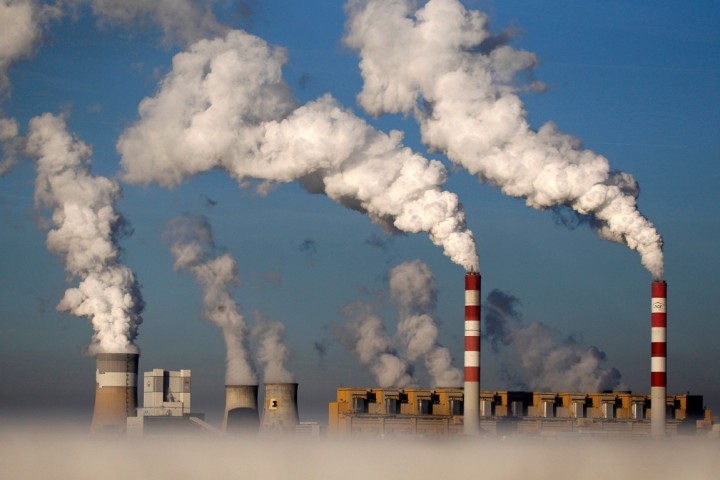Parliament to vote on groundbreaking EU ‘compensation right’ against pollution

Lawmakers must secure a right to effective health compensation for citizens who are victims of unlawful pollution, says a letter signed by a coalition of environmental groups and sent to the European Parliament on Thursday (6 July).
More than 300,000 deaths in 2020 were attributed to air pollution in Europe, according to the European Environment Agency (EEA). Air pollution is also linked to a wide range of serious diseases, such as cancer, heart and pulmonary diseases was well as neurological conditions, making it one of the deadliest environmental risks in Europe.
Italy has been singled out for failing to meet the bloc’s air quality standards and was condemned by the European Court of Justice last year for breaching the bloc’s pollution limits. In Poland, the southern city of Nowy Sącz was found to have the worst air quality in the EU, according to a ranking by the EEA published in 2021.
The bloc’s Industrial Emissions Directive (IED) and Ambient Air Quality Directive (AAQD) are designed to regulate pollution from large emitters, in line with the EU’s Zero Pollution Action Plan.
Both texts are being voted this week in the European Parliament’s plenary session in Strasbourg – the industrial emissions directive on Tuesday (11 July) and the air quality directive on Wednesday (12 July).
Right to compensation
Negotiations for both directives have led to the adoption of a provision that empowers citizens to seek justice and compensation for health issues caused by illegal levels of pollution.
“Where damage to human health has occurred as a result of a violation of [EU air quality rules], Member States should ensure that the individuals affected by such violations are able to claim and obtain compensation for that damage from the relevant competent authority,” states the proposed air quality directive.
The clause, initially introduced by the European Commission and upheld by the Parliament’s environment committee, is the first of its kind in EU environmental law.
It would create an incentive for industry to comply with the directives, and stricter penalties for authorities who fail to take the necessary measures to clean the air.
“It is really heartening to see MEPs finally starting to take people’s right to health seriously,” said Emma Bud, a lawyer with environmental advocacy group ClientEarth. “By now, there is a towering body of evidence on exactly how air pollution affects the human body, with more emerging all the time,” she said in response to the adtoption of the revised air quality directive in the Parliament’s Environment Committee on 27 June.
In spite of the initial ambition, however, the compensation provision was weakened in the final vote.
“The original draft of the EU’s updated industrial emissions law contained a breakthrough clause on evidence that would have allowed people to go to court with a genuine chance of achieving justice. What’s on the table now is already the bare minimum,” said another lawyer for ClientEarth, Bellinda Bartolucci.
Environmental organisations maintain that the right to compensation is vital for the protection of citizens’ health.
“An effective compensation right is a no-brainer,” Bartolucci argued.
The Council of the EU, which represents the bloc’s 27 member states, adopted its negotiating position on the industrial emissions directive in March, but has yet to do so for the air quality directive. A so-called “general approach” there is unlikely before October, a Council spokesperson said.
Postponements in Parliament cannot be ruled out either, as the air quality vote initially scheduled for Wednesday risks being delayed to the September plenary session, a spokesperson told EURACTIV.
Radan Kanev, a Bulgarian MEP with the centre-right European People’s Party (EPP) and Parliament rapporteur for the industrial emissions directive, is certain that it will be a difficult vote.
But he expects Parliament to aim higher than the Council of the European Union, which brings together the 27 member states.
“The acknowledgement of scientific data as an important evidence will be at the core of the European Parliament mandate,” Kanev told EURACTIV. “And in any case, the European Parliament will be with a significantly higher ambition than the Council.”
Economic consequences
Both directives have been received with scepticism by right-wing and conservative lawmakers who have raised concerns about the possible consequences on the economy.
During a plenary debate in the Committee of the Regions on Wednesday (July 5), Italian members expressed their worries about the impact of the air quality directive on the economy and social development.
Industry groups have also questioned the compensation right in the industiral emissions directive, fearing that it may lead to excessive litigation.
But environmental organisations say these fears as “unfounded”, stressing that the provision concerns only unlawful industry activities.
“The compensation right is limited to human health impacts, caused by illegal pollution only, based on facts that must still be provided by the victim. Law-abiding businesses have nothing to fear,” said Christian Schaible from the European Environmental Bureau (EEB), a green umbrella group.
As the plenary vote on the industrial emissions directive approaches, campaigners are urging MEPs to take action and avoid any further delays.
“Citizens will not forgive and forget the politicians who voted against their interests – something MEPs need to remember with elections coming up,” Schaible said.
I hope it has a good effect
I think those ones were fighting against pollution of their land and flight of their resources without adequate compensation. If this is right, then we can say they were fighting for a good cause. They were kidnapping oil workers to discourage oil production.
“Let's take a stand against plastic pollution! .
Solar energy offers a glimmer of hope in the fight against pollution and climate change.

